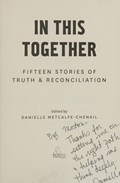Narrow Results By
Carrying the burden of peace : reimagining Indigenous masculinities through story
https://archives.whyte.org/en/permalink/catalogue25728
- Medium
- Library - Book (including soft-cover and pamphlets)
- Published Date
- 2021
- Author
- McKegney, Sam
- Publisher
- Regina, Saskatchewan, Canada : University of Regina Press
- Call Number
- 07.2 M19c
- Author
- McKegney, Sam
- Publisher
- Regina, Saskatchewan, Canada : University of Regina Press
- Published Date
- 2021
- Physical Description
- xxxiii, 263 pages : illustrations ; 24 cm
- Subjects
- Indigenous
- Indigenous Culture
- Indigenous Customs
- Indigenous Peoples
- Indigenous Traditions
- Masculinity
- Canada
- History
- Abstract
- Through rigorous engagement with Indigenous literary art, Carrying the Burden of Peace highlights the decolonial potential of Indigenous masculinities. Can a critical examination of Indigenous masculinities be an honour song--one that celebrates rather than pathologizes; one that seeks diversity and strength; one that overturns heteropatriarchy without centering settler colonialism? Can a critical examination of Indigenous masculinities even be creative, inclusive, erotic? Carrying the Burden of Peace answers affirmatively. Countering the perception that masculinity has been so contaminated as to be irredeemable, the book explores Indigenous literary art for understandings of masculinity that exceed the impoverished inheritance of colonialism. Carrying the Burden of Peace weaves together stories of Indigenous life, love, eroticism, pain, and joy to map the contours of diverse, empowered, and non-dominant Indigenous masculinities. It is from here that a more balanced world may be pursued. -- Provided by publisher.
- Contents
- Indigenous masculinities and story -- Shame and deterritorialization -- Journeying back to the body -- De(f/v)iant generosity: gender and the gift -- Masculinity and kinship -- Naked and dreaming forward: a conclusion.
- ISBN
- 9780889777934
- Accession Number
- P2023.15
- Call Number
- 07.2 M19c
- Collection
- Archives Library
This material is presented as originally created; it may contain outdated cultural descriptions and
potentially offensive content.
Read more.
Decolonizing sport
https://archives.whyte.org/en/permalink/catalogue26241
- Medium
- Library - Book (including soft-cover and pamphlets)
- Published Date
- 2023
- Publisher
- Halifax ; Winnipeg : Fernwood Publishing
- Call Number
- 07.2 F77d
- Responsibility
- Edited by Janice Forsyth, Christine O'Bonsawin, Russell Field, and Murray G. Phillips
- Publisher
- Halifax ; Winnipeg : Fernwood Publishing
- Published Date
- 2023
- Physical Description
- xi, 276 pages : illustrations ; 23 cm
- Subjects
- Canada
- History-Canada
- Education
- Sport
- Indigenous
- Indigenous Culture
- Indigenous People
- Indigenous Traditions
- Indigenous Customs
- Abstract
- The path to decolonization is difficult and complex, and can even be contradictory at times, as when an Indigenous community enlists the same corporate sponsor that will destroy its natural environment to provide sport programming for its youth. There is no easy way forward. The Black Lives Matter movement, and their massive followers on social media, propelled forward discussions about the inequities that Covid-19 highlighted with unprecedented momentum. Indigenous people in Canada voiced their concerns in solidarity, calling attention to disparities they faced in everything from impoverished Indigenous health care initiatives to the overrepresentation of Indigenous people in the Canadian justice system, demanding to be heard alongside systemic change. Structural adjustments were afoot, including changes in the professional sport leagues. In both the United States and Canada, people witnessed the toppling of racist sports team names and logos in the spring and summer, not the least of which included the American Washington NFL team (Redskins) and the Canadian Edmonton CFL team (Eskimos). Clearly Indigenous people and their allies saw sport as a part of this desire for social change. This multi-authored collection contributes to that desire by bringing the work of Indigenous and non-Indigenous allied scholars together to explore the history of sport, physical activity, and embodied physical culture in the Indigenous context. Including chapters that address Indigenous topics beyond the political boundaries of Canada, including the US, Australia, New Zealand/Aotearoa, and Kenya, this collection considers questions such as: How can the history of sport (a colonizing practice with European origins) exist in dialogue with Indigenous voices to open up possibilities for reconsidering the history of modern sport? How can Indigenous and anti-oppressive research methodologies/methods inform the study of sport history? What are the ethics and responsibilities associated with conducting an Indigenous sport or recreation history? How can sport history as a discipline be open to the study of traditional land-based recreation? How can the meanings of "sport" be made more inclusive to include a variety of recreational practices? How can sport historians learn from histories of colonization and how can they contribute to a more reciprocal approach to knowledge formation through Indigenous community engagement? How can the discipline of sport history meaningfully support movements of Indigenous resurgence, regeneration, and decolonization? -- Provided by publisher.
- Contents
- Ways of knowing: sport, colonialism, and decolonization / Janice Forsyth, Christine O'Bonsawin, Russell Field -- Beyond competition: an Indigenous perspective on organized sport / Brian Rice -- More than a mascot: how the mascot debate erases Indigenous people in sport / Natalie Welch -- Witnessing painful pasts: understanding images of sports at Canadian Indian residential schools / Taylor McKee and Janice Forsyth -- The absence of Indigenous moving bodies: whiteness and decolonizing sport history / Malcolm MacLean -- # 87: using Wikipedia for sport reconciliation / Victoria Paraschak -- Olympism at face value: the legal feasibility of Indigenous-led Olympic Games / Christine O'Bonsawin -- Canoe racing to fishing guides: sport and settler colonialism in Mi'kma'ki / John Reid -- Transcending colonialism?: rodeos and racing in Lethbridge / Robert Kossuth -- "Men pride themselves on feats of endurance": masculinities and movement cultures in Kenyan running history / Michelle M. Sikes -- Stealing, drinking, and not cooperating: sport and everyday resistance in Aboriginal settlements in Australia / Gary Osmond -- Let's make baseball!: practices of unsettling on the recreational ball diamonds of Tkaronto/Toronto / Craig Fortier and Colin Hastings -- Subjugating and liberating at once: Indigenous sport history as a double-edge sword / Brendan Hokowhitu.
- ISBN
- 9781773636344
- Accession Number
- P2024.02
- Call Number
- 07.2 F77d
- Collection
- Archives Library
This material is presented as originally created; it may contain outdated cultural descriptions and
potentially offensive content.
Read more.
Canadian law and indigenous self-determination : a naturalist analysis
https://archives.whyte.org/en/permalink/catalogue25724
- Medium
- Library - Book (including soft-cover and pamphlets)
- Published Date
- 2019
- Author
- Christie, Gordon
- Publisher
- Toronto ; Buffalo ; London : University of Toronto Press
- Call Number
- 07.2 C46c
- Author
- Christie, Gordon
- Publisher
- Toronto ; Buffalo ; London : University of Toronto Press
- Published Date
- 2019
- Physical Description
- vi, 440 pages ; 23 cm
- Abstract
- For centuries, Canadian sovereignty has existed uneasily alongside forms of Indigenous legal and political authority. Canadian Law and Indigenous Self-Determination demonstrates how, over the last few decades, Canadian law has attempted to remove Indigenous sovereignty from the Canadian legal and social landscape. Adopting a naturalist analysis, Gordon Christie responds to questions about how to theorize this legal phenomenon, and how the study of law should accommodate the presence of diverse perspectives. Exploring the socially-constructed nature of Canadian law, Christie reveals how legal meaning, understood to be the outcome of a specific society, is being reworked to devalue the capacities of Indigenous societies. Addressing liberal positivism and critical postcolonial theory, Canadian Law and Indigenous Self-Determination considers the way in which Canadian jurists, working within a world circumscribed by liberal thought, have deployed the law in such a way as to attempt to remove Indigenous meaning-generating capacity. -- Provided by publisher.
- Contents
- Setting the stage -- Canadian law and its puzzles -- Differing understandings and the way forward -- Remarks on theorizing and method -- Problems with theorizing about the law -- Liberal positivism and aboriginal rights -- Characterizing and defining 'existing' aboriginal rights -- The place of aboriginal rights in Canada -- Postcolonial theory and aboriginal law.
- ISBN
- 9781442628991
- Accession Number
- P2023.12
- Call Number
- 07.2 C46c
- Collection
- Archives Library
This material is presented as originally created; it may contain outdated cultural descriptions and
potentially offensive content.
Read more.
Living in Indigenous sovereignty
https://archives.whyte.org/en/permalink/catalogue25686
- Medium
- Library - Book (including soft-cover and pamphlets)
- Published Date
- 2021
- Author
- Carlson-Manathara, Elizabeth and Rowe, Gladys
- Publisher
- Halifax ; Winnipeg : Fernwood Publishing
- Call Number
- 07.2 C21l
- Responsibility
- Foreword by Aime´e Craft, Leona Star and Dawnis Kennedy
- Publisher
- Halifax ; Winnipeg : Fernwood Publishing
- Published Date
- 2021
- Physical Description
- 302 pages ; 23 cm
- Abstract
- This book advances the concept of living in Indigenous sovereignty as an ontological and relational framework for settlers, particularly white settlers, who wish to initiate or deepen their decolonial/anti-colonial work while living on Indigenous lands occupied by the Canadian state. Here, living in Indigenous sovereignty refers to living in accordance with the understanding that we are on Indigenous lands which contain their own stories, systems of governance, relationships, laws, knowledges, protocols, obligations, and opportunities which have been understood and practiced by Indigenous peoples since time immemorial. Living in Indigenous sovereignty means understanding that our responsibilities and opportunities as settlers on these lands involve learning and placing ourselves in accountable and loving relationship with Indigenous lands, peoples, and sovereignty. Based on a completed dissertation, the book enacts accountability and embodies living in Indigenous sovereignty by centering the work and perspectives of Indigenous scholars, Knowledge holders, and activists regarding settler colonialism and decolonization. Thus, the theoretical and practice perspectives that point to pathways of living in Indigenous sovereignty are based largely on Indigenous sources. This work also features life stories/narratives of white settler activists for whom anti-colonial and decolonial work is a major life focus. These stories are intended to serve as inspiration and guidance for white settlers who wish to initiate or deepen their anti-colonial and decolonial work. Ultimately, this book aims to contribute to decolonial social change, particularly in Canada. I believe Fernwood would be a great fit as a publisher of this book due to its focus on confronting oppression and exploitation toward creating a more socially just world. Scholarship regarding frameworks for settler roles in decolonization has been historically sparse, although it has increased in the past decade (see complementary books below). Although most of the ideas in this book have been present in various forms in activist and Indigenous circles, the book will provide a deep and accessible exploration of living in Indigenous sovereignty and what this entails, as well as some of the tensions present in the work. Further, the approach of using extended life narratives of decolonial settler activists as a way to inspire others and illustrate the principles of the work in practice is something I haven't yet seen in book form. -- Provided by publisher.
- Contents
- Introductions / Elizabeth Carlson-Manathara and Gladys Rowe -- Settler Colonialism and Resistance / Elizabeth Carlson-Manathara -- Introducing the Narratives / Elizabeth Carlson-Manathara with Aime´e Craft, Dawnis Kennedy, Leona Star, and Chickadee Richard -- Monique Woroniak / Monque Woroniak and Elizabeth Carlson-Manathara -- Murray Angus / Murray Angus and Elizabeth Carlson-Manathara -- Steve Heinrichs / Steve Heinrichs and Elizabeth Carlson-Manathara -- Franklin Jones / Elizabeth Carlson-Manathara and Anonymous -- Orienting Toward Indigenous Sovereignty / Elizabeth Carlson-Manathara -- Joy Eidse / Joy Eidse and Elizabeth Carlson-Manathara -- Adam Barker / Adam Barker and Elizabeth Carlson-Manathara -- Susanne McCrea McGovern / Susanne McCrea McGovern and Elizabeth Carlson-Manathara -- Kathi Avery Kinew / Kathi Avery Kinew and Elizabeth Carlson-Manathara -- Rick Wallace / Rick Wallace and Elizabeth Carlson-Manathara -- What Indigenous Peoples Have Asked of Us / Elizabeth Carlson-Manathara -- John Doe / Elizabeth Carlson-Manathara and Anonymous -- Silvia Straka / Silvia Straka with Elizabeth Carlson-Manathara -- Dave Bleakney / Dave Bleakney with Elizabeth Carlson-Manathara -- Victoria Freeman / Victoria Freeman and Elizabeth Carlson-Manathara -- Honourings / Gladys Rowe and Elizabeth Carlson-Manathara -- Conclusions / Elizabeth Carlson-Manathara and Gladys Rowe -- Afterword / Gladys Rowe, Sherry Copenance, Yvonne Pompana, and Chickadee Richard.
- ISBN
- 9781773632384
- Accession Number
- P2023.02
- Call Number
- 07.2 C21l
- Location
- Reading Room
- Collection
- Archives Library
This material is presented as originally created; it may contain outdated cultural descriptions and
potentially offensive content.
Read more.
Voicing identity : cultural appropriation and Indigenous issues
https://archives.whyte.org/en/permalink/catalogue25701
- Medium
- Library - Book (including soft-cover and pamphlets)
- Published Date
- 2022
- Publisher
- Toronto ; Buffalo ; London : University of Toronto Press
- Call Number
- 07.2 B94v
- Responsibility
- Edited by John Borrows and Kent McNeil
- Publisher
- Toronto ; Buffalo ; London : University of Toronto Press
- Published Date
- 2022
- Physical Description
- vi, 328 pages : illustrations ; 24 cm
- Abstract
- Written by leading Indigenous and non-Indigenous scholars, Voicing Identity examines the issue of cultural appropriation in the contexts of researching, writing, and teaching about Indigenous peoples. This book grapples with the question: who is qualified to engage in these activities and how can this be done appropriately and respectfully? The authors address these questions from their own individual perspectives and experiences, often revealing personal struggles and their ongoing attempts to resolve them. There is diversity in perspectives and approaches, but also a common goal: to conduct research and teach in respectful ways that enhance understanding of Indigenous histories, cultures, and rights, and promote reconciliation between Indigenous and non-Indigenous peoples. Bringing together contributors with diverse backgrounds and unique experiences, Voicing Identity will be of interest to students and scholars studying Indigenous issues as well as anyone seeking to engage in the work of making Canada a model for just relations between the original peoples and newcomers.-- Provided by publisher.
- Contents
- Introduction / John Borrows and Kent McNeil -- 1. Su-taxwiye: Keeping My Name Clean / Sarah Morales -- 2. At the Corner of Hawks and Powell: Settler Colonialism, Indigenous People, and the Conundrum of Double Permanence / Keith Thor Carlson -- 3. Look at Your "Pantses": The Art of Wearing and Representing Indigenous Culture as Performative Relationship / Aime´e Craft -- 4. Indigenous Legal Traditions, De-sacralization, Re-sacralization, and the Space for Not-Knowing / Hadley Friedland -- 5. Mino-audjiwaewin: Choosing Respect, Even in Times of Conflict / Lindsay Borrows -- 6. "How Could You Sleep When Beds Are Burning?" Cultural Appropriation and the Place of Non-Indigenous Academics / Felix Hoehn -- 7. Who Should Teach Indigenous Law? / Karen Drake and A. Christian Airhart -- 8. Reflections on Cultural Appropriation / Michael Asch -- 9. Turning Away from the State: Cultural Appropriation in the Shadow of the Courts / John Borrows -- 10. Voice and Indigenous Rights from a Non-Indigenous Perspective / Robert Hamilton -- 11. Guided by Voices? Perspective and Pluralism in the Constitutional Order / Joshua Ben David Nichols -- 12. NONU WEL,WEL TI,A´ NE T ,E E : Our Canoe Is Really Tippy / kQwa'st'not and Hannah Askew -- 13. Sharp as a Knife: Judge Begbie and Reconciliation / Hamar Foster -- 14. On Getting It Right the First Time: Researching the Constitution Express / Emma Feltes -- 15. Confronting Dignity Injustices / Sa'ke'j Henderson
- ISBN
- 9781487544683
- Accession Number
- P2023.10
- Call Number
- 07.2 B94v
- Collection
- Archives Library
This material is presented as originally created; it may contain outdated cultural descriptions and
potentially offensive content.
Read more.
School of racism : a Canadian history, 1830-1915
https://archives.whyte.org/en/permalink/catalogue26242
- Medium
- Library - Book (including soft-cover and pamphlets)
- Published Date
- 2023
- Author
- Larochelle, Catherine
- Publisher
- Winnipeg, Manitoba, Canada : University of Manitoba Press
- Edition
- First English-language edition
- Call Number
- 08.1 L32s
- Author
- Larochelle, Catherine
- Responsibility
- Translated by S.E. Stewart
- Edition
- First English-language edition
- Publisher
- Winnipeg, Manitoba, Canada : University of Manitoba Press
- Published Date
- 2023
- Physical Description
- viii, 464 pages : illustrations ; 24 cm
- Abstract
- Exposing the history of racism in Canada's classrooms Winner of the prestigious Clio-Quebec, Lionel-Groulx, and Canadian History of Education Association awards In School of Racism, Catherine Larochelle demonstrates how Quebec's school system has, from its inception and for decades, taught and endorsed colonial domination and racism. This English translation of the award-winning book extends its crucial lesson to readers across the country, bridging English- and French-Canadian histories to deliver a better understanding of Canada's past and present identity. Using postcolonial, antiracist, and feminist theories and methodologies, Larochelle examines late-nineteenth and early-twentieth-century classroom materials used in Quebec's public and private schools. Many of these textbooks, and others like them, made their way into curricula across Canada. Larochelle's innovative analysis illuminates how textual and visual representations found in these archives constructed Indigenous, Black, Arab, and Asian peoples as "the Other" while reinforcing the collective identity of Quebec, and Canada more broadly, as white. Uncovering the origins and persistence of individual and systemic racism against people of colour, Larochelle shows how Otherness was presented to--and utilized by--young Canadians for almost a century. School of Racism names the ways in which Canada's education system has supported and sustained ideologies of white supremacy--ideologies so deeply embedded that they still linger in school texts and programming today. The book offers new insight into how Canadian and Quebecois concepts of nationalism and racism overlap, helps educators confront racism in their classrooms, and deepens urgent discussions about race and colonialism throughout Canada. -- Provided by publisher.
- Contents
- Cover -- Contents -- Author's Note -- Introduction -- Chapter 1. The Theories of Otherness -- Chapter 2. Other Societies: Imperialist Knowledge and Orientalist Representations -- Chapter 3. The Other-Body, or Alterity Inscribed in the Flesh -- Chapter 4. The Indian: Domination, Erasure, and Appropriation -- Chapter 5. The Other Observed or "Teaching through the Eyes" -- Chapter 6. Of Missions and Emotions: Children and the Missionary Mobilization -- Conclusion -- Acknowledgements -- Appendix -- List of Abbreviations -- Notes -- Bibliography -- Index.
- ISBN
- 9781772840537
- Accession Number
- P2024.02
- Call Number
- 08.1 L32s
- Collection
- Archives Library
This material is presented as originally created; it may contain outdated cultural descriptions and
potentially offensive content.
Read more.
Transformative politics of nature : overcoming barriers to conservation in Canada
https://archives.whyte.org/en/permalink/catalogue26252
- Medium
- Library - Book (including soft-cover and pamphlets)
- Published Date
- 2023
- Publisher
- Toronto ; Buffalo ; London : University of Toronto Press
- Call Number
- 04 Ol4t
- Responsibility
- Edited by Andrea Olive, Chance Finegan, and Karen F. Beazley
- Publisher
- Toronto ; Buffalo ; London : University of Toronto Press
- Published Date
- 2023
- Physical Description
- x, 310 pages : illustrations (black and white), map ; 23 cm
- Subjects
- Environment
- Environmentalism
- Conservation
- Politics
- Indigenous
- Indigenous Peoples
- Law
- Canada
- Abstract
- Transformative Politics of Nature highlights the most significant barriers to conservation in Canada and discusses strategies to confront and overcome them. Featuring contributions from academics as well as practitioners, the volume brings together the perspectives of both Indigenous and non-Indigenous experts on land and wildlife conservation, in a way that honours and respects all peoples and nature. Contributors provide insights that enhance understanding of key barriers, important actors, and strategies for shaping policy at multiple levels of government across Canada. The chapters engage academics, environmental conservation organizations, and Indigenous communities in dialogues and explorations of the politics of wildlife conservation. They address broad and interrelated themes, organized into three parts: barriers to conservation, transformation through reconciliation, and transformation through policy and governance. Together, they demonstrate and highlight the need for increased social-political awareness of biodiversity and conservation in Canada, enhanced wildlife conservation collaborative networks, and increased scholarly attention to the principle, policies, and practices of maintaining and restoring nature for the benefit of all peoples, other species, and ecologies. Transformative Politics of Nature presents a vision of profound change in the way humans relate to each other and with the natural world. -- Provided by publisher.
- Contents
- OPENING CEREMONY -- Beginning / Shalan Joudry -- PART A: INTRODUCTION -- 1. From politics to transformative politics in Canada / Karen F. Beazley, Andrea Olive, and Chance Finegan -- INTRODUCING DISRUPTIONS / Chance Finegan -- PART B: BARRIERS TO CONSERVATION IN CANADA -- 2. A pathological examination of conservation failure in Canada / Christopher J. Lemieux, Mark W. Groulx, Trevor Swerdfager, and Shannon Hagerman -- 3. Who should govern wildlife? Examining attitudes across the country / Matthew A. Williamson, Stacy Lischka, Andrea Olive, Jeremy Pitman, and Adam T. Ford -- 4. In a rut: barriers to caribou recovery / Julee Boan and Rachel Plotkin -- 5. Enacting a reciprocal ethic of care: (finally) fulfilling treaty obligations / Larry McDermott and Robin Roth -- DISRUPTIONS, PART B -- Disrupting dominant narratives for a mainstream conservation issue: a case study on "saving the bees" / Sheila R. Colla -- The national parks in disrupting heritage interpretation on Turtle Island / Chance Finegan -- PART C: TRANSFORMATION THROUGH VALUES -- 6. Reconciliation or Apiksitaultimik? indigenous relationality for conservation / Sherry Pictou -- 7. "etuaptmumk / two-eyed seeing and reconciliation with Earth" / Deborah McGregor, Jesse Popp, Andrea Reid, Elder Albert Marshall, Jacquelyn Miller, and Mahisha Sritharan -- 8. Beacons of teachings / Lisa Young -- DISRUPTIONS, PART C -- Indigenous knowledge as a disruption to state-led conservation / Natasha Myhal -- The Misipawistik Cree Nation kanawenihcikew guardians program / Heidi Cook -- PART D: TRANSFORMATION THROUGH ACTION -- 9. Transforming university cirriculum and student experiences through collaboration and land-based learning / Melanie Zurba, James Doucette, and Bridget Graham -- 10. Ecological networks and corridors in the context of global initiatives / Jodi A. Hilty and Stephen Woodley -- 11. The imperative for transformative change to address biodiversity loss in Canada / Justina C. Ray -- DISRUPTIONS, PART D. -- Conservation bright spots: focusing on solutions instead reacting to problems / Barbara Frei -- Disrupting current approaches to biodiversity conservation through innovative knowledge mobilization / Vivian Nguyen -- PART E: CONCLUSION -- 12. Achieving transformative change: conservation in Canada, 2023 and beyond / Andrea Olive and Karen F. Beazley -- CLOSING CEREMONY -- Onward / Shalan Joudry
- ISBN
- 9781487550516
- Accession Number
- P2024.02
- Call Number
- 04 Ol4t
- Collection
- Archives Library
This material is presented as originally created; it may contain outdated cultural descriptions and
potentially offensive content.
Read more.
Bead by bead : constitutional rights and Métis community
https://archives.whyte.org/en/permalink/catalogue25524
- Medium
- Library - Book (including soft-cover and pamphlets)
- Published Date
- 2021
- Publisher
- Vancouver, British Columbia : University of British Columbia Press
- Call Number
- 07.2 B71b
- Responsibility
- Edited by Yvonne Boyer and Larry Chartrand
- Publisher
- Vancouver, British Columbia : University of British Columbia Press
- Published Date
- 2021
- Physical Description
- xii, 221 pages ; 24 cm
- Subjects
- Indigenous
- Metis
- Canada
- Politics
- Colonialism
- Identity
- Abstract
- What does the phrase Me´tis peoples mean in constitutional terms? As lawyers and scholars dispute forms of Me´tis identity, and debate the nature and scope of Me´tis rights under the Canadian Constitution, understanding Me´tis experience of colonization is fundamental to achieving reconciliation. In Bead by Bead, contributors address the historical denial - at both federal and provincial levels - of outstanding Me´tis concerns and Aboriginal rights claims, in particular with respect to land, resources, and governance. Tackling such themes as ongoing colonial policies, the invisibility of Me´tis women in court decisions, identity politics, and racist legal principles, they uncover the troubling issues that plague Me´tis aspirations for a just future. This nuanced analysis of the parameters that current Indigenous legal doctrines place around Me´tis rights discourse moves beyond a one-size-fits-all definition of Me´tis or a uniform approach to Aboriginal rights. By raising critical questions about self-determination, colonization, kinship, land, and other essential aspects of Me´tis lived reality, these clear-eyed essays go beyond legal theorizing and create pathways to respectful, inclusive Me´tis-Canadian constitutional relationships. (Provided by Publisher)
- Contents
- Me´tis identity captured by law: struggles over use of the category Me´tis in Canadian law / Se´bastien Grammond ; Recognition and reconciliation: recent developments in Me´tis rights law / Thomas Isaac ; Shifting the status quo: the duty to consult and the Me´tis of British Columbia / Christopher Gall and Brodie Douglas ; The resilience of Me´tis title: rejecting assumptions of extinguishment / Karen Drake and Adam Gaudry ; Where are the women? Analyzing the three Me´tis Supreme Court of Canada decisions / Brenda L. Gunn ; Manitoba Me´tis Federation and Daniels: "post-legal" reconciliation and Western Me´tis / Jeremy Patzer ; Colonial ideologies: the denial of Me´tis political identity in Canadian law / D'Arcy Vermette ; Me´tis Aboriginal rights: four legal doctrines / Darren O'Toole ; Suzerainty, sovereignty, jurisdiction: the future of Me´tis ways / Signa A. Daum Shanks.
- ISBN
- 9780774865975
- Accession Number
- P2022.04
- Call Number
- 07.2 B71b
- Collection
- Archives Library
This material is presented as originally created; it may contain outdated cultural descriptions and
potentially offensive content.
Read more.
Royally wronged : the Royal Society of Canada and Indigenous Peoples
https://archives.whyte.org/en/permalink/catalogue25570
- Medium
- Library - Book (including soft-cover and pamphlets)
- Published Date
- 2021
- Publisher
- Montreal ; Kingston ; London ; Chicago : McGill-Queen's University Press
- Call Number
- 08.1 B12r
- Responsibility
- Edited by Constance Backhouse, Cynthia E. Milton, Margaret Kovach, and Adele Perry
- Publisher
- Montreal ; Kingston ; London ; Chicago : McGill-Queen's University Press
- Published Date
- 2021
- Physical Description
- xvii, 365 pages : illustrations ; 23 cm
- Abstract
- The Royal Society of Canada's mandate is to elect to its membership scholars in the arts, humanities, social sciences, and sciences, lending its seal of excellence to those who advance artistic and intellectual knowledge in Canada. Duncan Campbell Scott, one of the architects of the Indian residential school system in Canada, served as the society's president and dominated its activities; many other members - historically overwhelmingly white men - helped shape knowledge systems rooted in colonialism that have proven catastrophic for Indigenous communities. Written primarily by current Royal Society of Canada members, these essays explore the historical contribution of the RSC and of Canadian scholars to the production of ideas and policies that shored up white settler privilege, underpinning the disastrous interaction between Indigenous peoples and white settlers. Historical essays focus on the period from the RSC's founding in 1882 to the mid-twentiethcentury; later chapters bring the discussion to the present, documenting the first steps taken to change damaging patterns and challenging the society and Canadian scholars to make substantial strides toward a better future. The highly educated in Canadian society were not just bystanders: they deployed their knowledge and skills to abet colonialism. Royally Wronged dives deep into the RSC's history to learn why academia has more often been an aid to colonialism than a force against it, posing difficult questions about what is required to move meaningfully toward reconciliation.
- Contents
- Foreword / Cindy Blackstock ; Introduction: the Royal Society of Canada and the marginalization of Indigenous knowledge / Constance Backhouse and Cynthia E. Milton ; Rather of promise than of performance: tracing networks of knowledge and power through the Proceedings and Transactions of the Royal Society of Canada, 1882-1922 / Ian Wereley ; Duncan Campbell Scott and the Royal Society of Canada: the legitimation of knowledge / Constance Backhouse ; "Perhaps the white man's God has willed it so": reconsidering the "Indian" poems of Pauline Johnson and Duncan Campbell Scott / Carole Gerson ; "Sooner or later they will be given the privelage [sic] asked for": Duncan Campbell Scott and the dispossession of Shoal Lake 40, 1913-14 / Adele Perry ; Three fellows in Mi'kma'ki: the power of the avocational / John G. Reid ; "Not a little disappointment": forging postcolonial academies from emulation and exclusion / Cynthia E. Milton ; Nostra culpa? Reflections on "The Indian in Canadian Historical Writing" / James W. St G. Walker ; Forensic anthropology and archaeology as tools for reconciliation in investigations into unmarked graves at Indian residential schools / Katherine L. Nichols, Eldon Yellowhorn, Deanna Reder, Emily Holland, Dongya Yang, John Albanese, Darian Kennedy, Elton Taylor, and Hugo F.V. Cardoso ; Confronting "Cognitive Imperialism": what reconstituting a contracts law school course is teaching me about law / Jane Bailey ; Murder they wrote: unknown knowns and Windsor Law's statement regarding R. v. Stanley / Reem Bahdi ; History in the public interest: teaching decolonization through the RSC Archive / Jennifer Evans, Meagan Breault, Ellis Buschek, Brittany Long, Sabrina Schoch, and David Siebert ; Cause and effect: the invisible barriers of the Royal Society of Canada / Joanna R. Quinn ; Memorandum to the Royal Society of Canada (2019) / Marie Battiste and James Sákéj Youngblood Henderson, endorsed / John Borrows, Margaret Kovach, Kiera Ladner, Vianne Timmons, and Jacqueline Ottmann ; Golden Eagle Rising: a conversation on Indigenous knowledge and the Royal Society of Canada / Shain Jackson and Cynthia E. Milton ; Afterword: closing circle words / Margaret Kovach
- ISBN
- 9780228009115
- Accession Number
- P2022.13
- Call Number
- 08.1 B12r
- Collection
- Archives Library
This material is presented as originally created; it may contain outdated cultural descriptions and
potentially offensive content.
Read more.
In this together : fifteen stories of truth & reconciliation
https://archives.whyte.org/en/permalink/catalogue25657
- Medium
- Library - Book (including soft-cover and pamphlets)
- Published Date
- 2016
- Publisher
- Victoria, B. C. : Brindle & Glass Publishing, an imprint of TouchWood Editions
- Call Number
- 07.2 M56i
- Responsibility
- Edited by Danielle Metcalfe-Chenail
- Publisher
- Victoria, B. C. : Brindle & Glass Publishing, an imprint of TouchWood Editions
- Published Date
- 2016
- Physical Description
- 215 pages ; 22 cm
- Subjects
- Indigenous
- History
- Canada
- Abstract
- A collection of essays about reconciliation and anti-racism by Indigenous and non-Indigenous contributors from across Canada.
- Contents
- Introduction / Danielle Metcalfe-Chenail; The importance of rivers / Carleigh Baker; Dropped, not thrown / Joanna Streetly; Drawing lines / Erika Luckert; Jawbreakers / Donna Kane; This many-storied land / Kamala Todd; The perfect tool / Zacharias Kunuk; To kill an Indian / Steven Cooper with Twyla Campbell; Two-step / Katherin Edwards; Echo / Carol Shaben; Mother tongues / Katherine Palmer Gordon; White Aboriginal woman / Rhonda Kronyk; Colonialism lived / Emma Larocque; Marking the page / Lorri Neilsen Glenn; Lost fires still burn / Carissa Halton; From Aha to AHO! / Antione Mountain; A conversation between Shelagh Rogers and the Honourable Justice Murray Sinclair.
- ISBN
- 9781927366448
- Accession Number
- P2022.14
- Call Number
- 07.2 M56i
- Collection
- Archives Library
This material is presented as originally created; it may contain outdated cultural descriptions and
potentially offensive content.
Read more.










